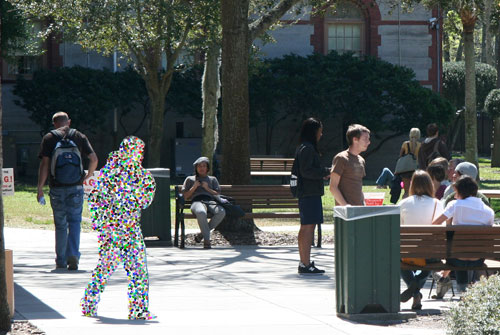
Flu symptoms, viral outbreaks increase this year, says Baringer
By Jennifer Swift | gargoyle@flagler.edu
Freshman Kerri Paulsen has been ill twice this semester.
“When my roommates get sick, I know it’s only a matter of time before I get sick,” she said. “It stinks. I am too sick to go to class, and when I do go to class, I’m too sick to pay attention.”
The Office of Academic Affairs reported an increase this semester in illness-related class cancelations and student absences.
Students have shown some symptoms of the flu, but most appear to have milder infections, according to Dr. Dudley Baringer, the on-campus doctor at Flagler College.
“This has been a year that has been more viral in illnesses than compared to past years,” he said.
Baringer attributes the increase in illnesses to students bringing the viruses back with them after winter break.
The Centers for Disease Control and Prevention recommends getting plenty of sleep, being physically active, properly managing stress, drinking plenty of water and eating nutritious food as important habits to practice in order to stay healthy.
While students may find it easier to practice these habits at home, once they return to school, the demands of schoolwork and jobs begin to take their toll. According to Baringer, this presents a problem.
He finds that students tend to push their bodies to unhealthy limits with late nights and poor diets.
“This can lower the defenses,” Baringer said.
Daniel Barton, a sophomore, learned this fact last month when he developed a cough one Saturday, became nauseated on Sunday, and on Monday, learned he had the flu. This happened after getting little to no sleep for several days.
“I couldn’t get out of bed,” he said. “If I did, I was really, really dizzy and could hardly walk.”
Barton joins approximately 175 other students who have an excused absence this semester. Despite the excuse, he still faces the danger of being dropped from a course if he should miss any more days.
“An excused absence still counts towards your number of total absences,” said Yvan Kelly, assistant dean of academic affairs.
Since the beginning of the semester, there have been a total of 104 class cancelations.
Dr. Vincent Puma, professor of English and one of Barton’s instructors, canceled five classes when he developed the flu.
“During the worst of my symptoms, I was running on autopilot,” he said. “It was absolutely awful trying to keep my head above water.”
The effects of his illness are still being felt in his classroom.
“You try to get into a rhythm,” Puma said. “When you throw it off, you get all kinds of problems.”
Puma says students should stay home when sick.
“I always believe that priority No. 1 is the self,” he said. “Take care of yourself first — worry about the rest later. Even if you are in class, are you really there? Stay home. Get well.”
Staying away from others is crucial to stopping the spread of germs, according to the CDC. Going to class creates the risk of getting fellow classmates or teachers sick, and continues the cycle of illnesses circulating through Flagler.
The CDC also advises covering your mouth and nose when sneezing to prevent the spread of germs.
If you become ill, Baringer advises getting plenty of rest, staying well hydrated, and taking over-the-counter medications such as Sudafed for nasal congestion, Ibuprofen or Tylenol for fever and aches, and a warm salt water gargle for throat irritation.
An ineffective flu shot has led to a nationwide increase in the number of flu cases this year. The shot has proven to be a good match for only 40 percent of the flu viruses this flu season.
Other states, including Tennessee, have shut down school districts for sick days as the virus runs rampant. Florida has not seen a massive outbreak.
Unlike bacterial illnesses, viral infections like the flu cannot be treated with antibiotics. Once diagnosed, Barton could only treat the symptoms.
Viral infections are spread by direct contact with the viral contaminant.
“Washing your hands is the biggest way to prevent it,” said Flagler Nurse Holly Hagler. “If your roommate coughs and puts a hand on the doorknob, and you grab the doorknob after them, you may get sick if you don’t wash your hands.”


Be the first to comment on "Illnesses travel fast on campus"